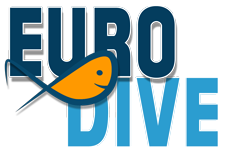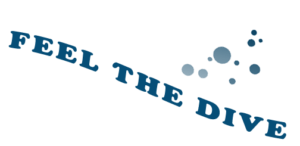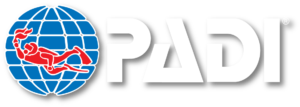DISCOVER SCUBA DIVING
Who is it for?
Have you always wondered what it’s like to breathe underwater?
If you want to try scuba diving, but aren’t quite ready to take the plunge into a certification course, Discover Scuba Diving is for you.
EURO DIVE offers this program either in a pool or off a beach. While not a scuba certification course, Discover Scuba Diving is a quick and easy introduction to what it feels like to explore the underwater world.
To sign up for a PADI Discover Scuba Diving experience, you must be at least 10 years old. No prior experience with scuba diving is necessary.
What will you learn?
You learn the basic safety guidelines and skills needed to dive under the direct supervision of a PADI Professional. If you move on to do your PADI open water certification, you’ll practice a few more skills in shallow water to prepare for your adventure.
Get ready to:
- Go over the scuba equipment you use to dive and the golden rules of diving
- Find out what it’s like to breathe underwater and how easy it is to move around underwater.
- Learn key skills that you’ll use on every scuba dive.
- Have fun swimming around and exploring. See some fish and other cool animals up close!
- Hear about becoming a certified diver through the PADI Open Water Diver course.
Breathing underwater for the first time is thrilling, so don’t wait.
BUBBLE MAKER
Who is it for?
If you want to try scuba diving and you are between 8 and 10 years old, you can try the Bubble Maker experience.
EURO DIVE offers this program either in a pool or off a beach. The Bubble Maker experience is a quick and easy introduction for kids to experience what it feels like to explore the underwater world under the direct supervision of an instructor, in a very calm sea and to a maximum depth of 2m.
To sign up for a PADI Bubble Maker experience, you must be at least 8 years old.
What will you learn?
You learn the basic safety guidelines and skills needed to dive under the direct supervision of a PADI Professional. The shallow reef behind the dive centre is an ideal site to discover coral reef life in very protected waters.
REFRESHER
Who is it for?
Haven’t been diving lately and want to refresh your dive skills? The Refresher program is the perfect way to regain your confidence and update what you learned in the Open Water Diver Course before jumping back into the water.
What will you learn?
The Refresher course consists of:
- Knowledge to update basic principles of scuba diving.
- Set up and check your scuba gear prior diving
- Confined Water Dives to refresh your scuba skills
- Open Water Dives to feel a diver again
SCUBA DIVER
Who is it for?
The PADI Scuba Diver course is a subset of the PADI Open Water Diver course. If you’re short on time but really want to become a certified diver, the PADI Scuba Diver rating might be right for you. This course is an intermediate step for earning an Open Water Diver certification, if that’s your ultimate goal.
PADI Scuba Divers are qualified to:
- Dive under the direct supervision of a PADI Professional to a maximum depth of 12 metres.
- Continue dive training by completing the PADI Open Water Diver certification and take certain specialty diver courses.
To enrol in a PADI Scuba Diver course (or Junior Scuba Diver course), you must be 10 years old or older. No prior experience with scuba diving is required, but you can try it first through the Discover Scuba Diving program.
What will you learn?
The PADI Scuba Diver course consists of three main phases:
- Knowledge Development at the diving centre or online to understand the basic principles of scuba diving.
- Confined Water Dives to learn basic scuba skills
- Open Water Dives to use your skills and explore (2 dives at 12m )!
Check with with us about the gear you’ll use during this course and get advice about everything you need from your PADI Instructor.
OPEN WATER COURSE
Who is it for?
If you’ve always wanted to take scuba diving lessons, experience unparalleled adventure and see the world beneath the waves, this is where it starts. Get your scuba diving certification with the PADI Open Water Diver course – the world’s most popular and widely recognized scuba course. Millions of people have learned to scuba dive and gone on to discover the wonders of the aquatic world through this course.
To enrol in a PADI Open Water Diver course (or Junior Open Water Diver course), you must be 10 years old or older. You need adequate swimming skills and need to be in good physical health. No prior experience with scuba diving is required.
What will you learn?
The PADI Open Water Diver course consists of three main phases:
- Knowledge Development online, independent study or in a classroom to understand the basic principles of scuba diving
- Confined Water Dives to learn basic scuba skills (5 dives)
- Open Water Dives to use your skills and explore (4 dives: 2 to 12 m and 2 to 18 m)!
Short on time? The PADI Scuba Diver course might be right for you.
Check with us about the gear you’ll use during this course and get advice about everything you need from your PADI Instructor.
ADVANCED OPEN WATER
Take it further and deeper
That’s what the PADI Advanced Open Water Diver course is all about. You don’t have to be “advanced” to take it – it’s designed to advance your diving, so you can start right after earning your PADI Open Water Diver certification. The course helps build confidence and expand your scuba skills through different Adventure Dives. You try out different specialities while gaining experience under the supervision of your PADI Instructor. You log dives and develop capabilities as you find new ways to have fun scuba diving.
Get credit! Each Adventure Dive may credit toward the first dive of the corresponding PADI Speciality Diver Course. If you’ve already taken a speciality diver course, ask your instructor if you’ve earned credit for an Adventure Dive.
Who should take this course?
PADI (Junior) Open Water Divers who are at least 12 years old are ready to step up and enrol in an Advanced Open Water Diver course.
If you’re already an Adventure Diver, you only need to complete two more Adventure Dives to earn the Advanced Open Water Diver certification.
What will you learn?
You’ll plan your learning path with your instructor by choosing from a long list of Adventure Dives. There are two required dives – Deep and Underwater Navigation – and you choose the other three, for a total of five dives.
During the Deep Adventure Dive, you learn how to plan dives to deal with the physiological effects and challenges of deeper scuba diving.
The Underwater Navigation Adventure Dive refines your compass navigation skills and helps you better navigate using kick-cycles, visual landmarks and time.
The other knowledge and skills you get vary with your interest and the adventures you have – photography, buoyancy control, fish identification, exploring wrecks and many more.
ADVENTURE DIVES
With 3 Adventure dives you can become an adventure diver, with 5 adventure dives (deep and navigation mandatory) you will become and advanced open water diver.
Example of adventure dives are:
- Deep
- Wreck
- Night
- Navigation
- Peak performance buoyancy
- Naturalist
- Drift
- Fish ID
- Multilevel and computer
RESCUE DIVER
Who is it for?
Scuba divers describe the PADI Rescue Diver course as the most challenging, yet most rewarding course they’ve ever taken. Why? Because you learn to prevent and manage problems in the water, and become more confident in your skills as a diver, knowing that you can help others if needed. During the course, you learn to become a better buddy by practising problem solving skills until they become second nature.
PADI (Junior) Advanced Open Water Divers who are at least 12 years old so have completed the Underwater Navigation Adventure Dive may enrol in a Rescue Diver course.
You also need to have Emergency First Response Primary and Secondary Care (CPR and First Aid) training within the past 24 months. You can complete this training during the Rescue Diver course.
What will you learn?
The PADI Rescue Diver course prepares you to deal with dive emergencies, minor and major, using a variety of techniques. Through knowledge development and rescue exercises, you learn what to look for and how to respond. During rescue scenarios, you put into practice your knowledge and skills. Topics include:
- Self rescue
- Recognizing and managing stress in other divers
- Emergency management and equipment
- Rescuing panicked divers
- Rescuing unresponsive divers
What scuba gear will you use?
You’ll use your basic scuba equipment and will need a pocket mask to practice in-water resuscitation. During exercises, you’ll work with an oxygen unit, floats, marker buoys and CPR mannequins. Your PADI Instructor will explain the equipment that you need and may suggest additional gear, such as your own first aid kit, which will be useful throughout your diving career.
EMERGENCY FIRST RESPONSE (EFR)
As one of the foremost international CPR and first-aid training companies, Emergency First Response courses give lay responders the confidence to handle medical emergencies – not just diving-related, but in everyday life. Similar to PADI programs, Emergency First Response courses, training materials and educational curricula were developed by experienced instructional designers.
Course content is based on patient care standards as published in the consensus view of the Basic Life Support (BLS) Working Group of the International Liaison Committee on Resuscitation (ILCOR). ILCOR is an international standards group representing most of the world’s major resuscitation organizations.
DIVEMASTER
Who is it for?
Love scuba diving? Want to share it with others on a whole new level? Take the PADI Divemaster course and do what you love to do as a career. Scuba divers look up to Divemasters because they are leaders who mentor and motivate others. As a Divemaster, you not only get to dive a lot, but also experience the joy of seeing others have as much fun diving as you do.
The PADI Divemaster course is your first level of professional training. Working closely with a PADI Instructor, you’ll fine-tune your dive skills, like perfecting the effortless hover, and refine your rescue skills so you anticipate and easily solve common problems. You’ll gain dive knowledge, management and supervision abilities so you become a role model to divers everywhere.
As a PADI Divemaster, you’ll lead others as you supervise scuba diving activities and assist with diver training. Whether you want to work at a faraway dive destination or close to home at a local dive shop, the adventure of a lifetime awaits you. PADI Divemasters are respected dive professionals who are aligned with the largest and most respected dive organization in the world – PADI.
PADI Rescue Divers who are at least 18 years old may enrol in the PADI Divemaster course. You also need to have:
- Emergency First Response Primary and Secondary Care (CPR and First Aid) training within the past 24 months.
- A medical statement signed by a physician within the last 12 months.
- At least 40 logged dives to begin the course and 60 dives to earn certification.
What will you learn?
The PADI Divemaster course teaches you to be a leader and take charge of dive activities. Through knowledge development sessions, water skills exercises and workshops, and hands-on practical assessment, you develop the skills to organize and direct a variety of scuba diving activities. Topics and practical workshops include:
- The role and characteristics of the PADI Divemaster
- Supervising dive activities and assisting with student divers
- Diver safety and risk management
- Divemaster conducted programs and specialized skills
- Business of diving and your career
- Awareness of the dive environment
- Dive setup and management
- Mapping an open water site
- Conducting dive briefings
- Organizing a search and recovery project and a deep dive
- Conducting a scuba review and skin diver course
- Assisting with Discover Scuba Diving and leading Discover Local Diving programs
You will have to read the Divemaster Manual and watch the Divemaster Video. Also you will use some other reference materials – like the PADI Instructor Manual and The Encyclopedia of Recreational Diving – that you’ll need during the course.
ASSISTANT INSTRUCTOR
Who is it for?
For those Divemasters who love to dive and want to take the first step to become PADI Instructors and start sharing your diving knowledge with students.
As a PADI Assistant Instructor, you not only gain additional experience as a PADI Professional Scuba Diver, but you also start learning the PADI system of diver education. You can act as an instructional scuba assistant and assume limited teaching responsibilities. It’s a great way to gain experience in order to become a PADI Open Water Scuba Instructor.
What’s involved?
The PADI Assistant Instructor course is the first portion of the PADI Instructor Development Course (IDC) and when followed by the PADI Open Water Scuba Instructor course (OWSI) and successful performance at the PADI Instructor Examination (IE), leads to certification as a PADI Open Water Scuba Instructor (OWSI). You build upon your abilities to organize and supervise scuba diving activities, while concentrating on developing teaching skills.
What will you learn?
- Knowledge development through self-study, quizzes, lectures and presentations
- Confined water skill review and assessment, workshops and presentations
- Open water workshops, rescue assessment and candidate presentations
- Teach academic presentations under the indirect supervision of a PADI Instructor
- During confined water dives, present initial skills training under the direct supervision of a PADI Instructor
- Evaluate Open Water Diver surface skills under the indirect supervision of a PADI Instructor
- Teach PADI Specialty courses under the direction of a PADI Instructor.
NITROX / ENRICHED AIR
Who is it for?
The PADI Enriched Air Diver course is PADI’s most popular specialty scuba course. Why? Because scuba diving with enriched air nitrox gives you more no decompression time, especially on repetitive scuba dives. If staying down longer and getting back in the water sooner sounds appealing, then don’t hesitate to become an enriched air diver.
What will you learn?
You’ll learn why diving with air that has higher oxygen and lower nitrogen content gives you more bottom time, along with enriched air equipment considerations. During a practical session, and two optional (or required) scuba dives, you’ll:
- Discuss managing oxygen exposure.
- Practice analysing oxygen content in your scuba tank.
- Set your dive computer for diving with enriched air nitrox.
You will have to read the Enriched Air Diver Manual and watch the Enriched Air Diving video.
DEEP SPECIALTY
Who is it for?
There’s something exciting and mysterious about exploring deeper dive sites while scuba diving. Sometimes it’s a wreck that attracts you below 18 metres/60 feet, or, on wall dives, it may be a giant fan or sponge. Whatever it is, to scuba dive with confidence at depths down to 40 metres/130 feet, you should take the PADI Deep Diver Specialty course.
If you’ve earned the PADI Adventure Diver rating or higher, and you’re at least 15 years old, you can enrol in the Deep Diver course.
What will you learn?
Your training starts by reviewing reasons for deep diving and how important it is to know your personal limits. During four deep dives with your instructor, you’ll go over:
- Specialized deep diving equipment.
- Deep dive planning, buddy contact procedures and buoyancy control.
- Managing your gas supply, dealing with gas narcosis and safety considerations.
You may be able to get college credit for the Deep Diver course.
Also, the first dive of this PADI Specialty Diver course may credit as an Adventure Dive toward your Advanced Open Water Diver certification.


